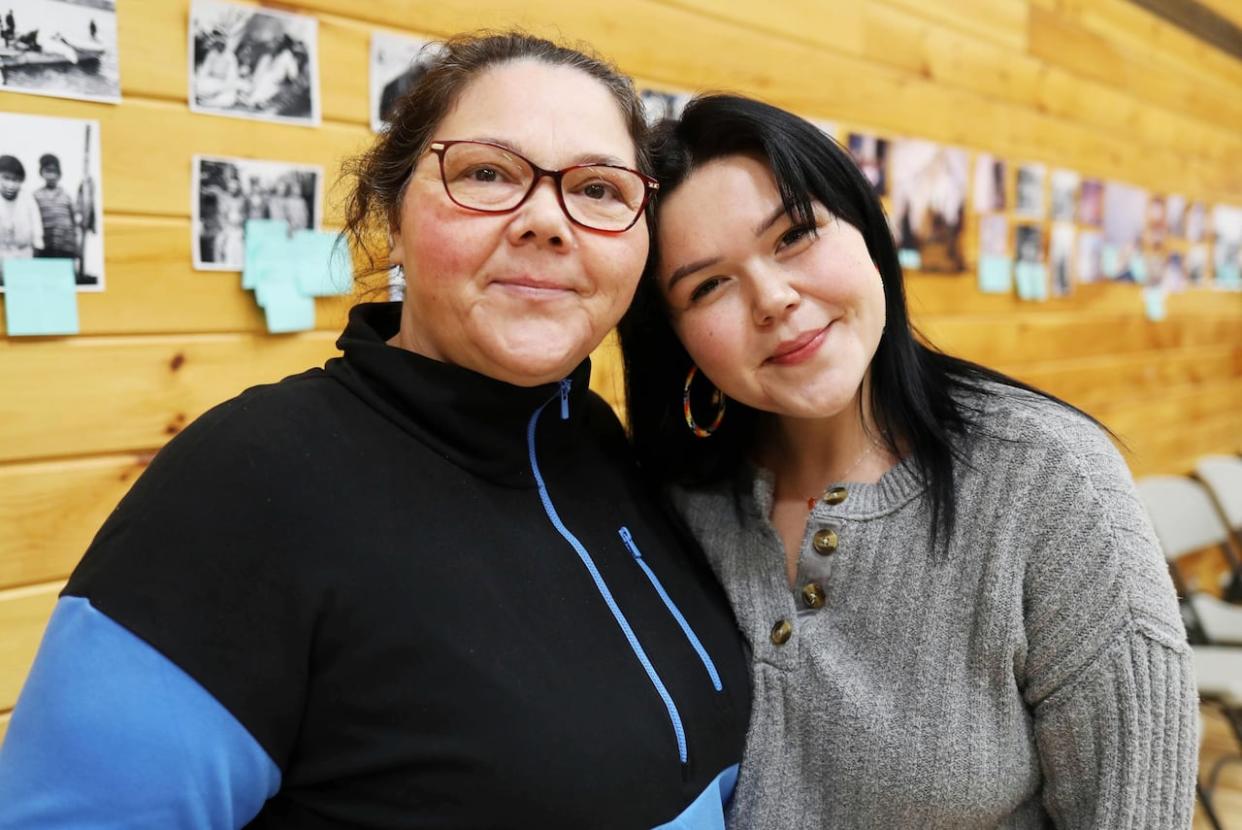Ripped from their roots: Inquiry emphasizes importance of keeping Innu children in their communities


Janet Bellefleur, left, and her daughter, Nykesha Gregoire. Bellefleur testified Wednesday at the Inquiry Respecting the Treatment, Experiences and Outcomes of Innu in the Child Protection System in Sheshatshiu about the importance of keeping Innu children in their home community. (Heidi Atter/CBC)
When Innu children age out of the foster care system, they sometimes have to rejoin a community, culture and language they've become estranged from — it can be a harmful and traumatic experience, one Janet Bellefleur says she works hard to mitigate.
Bellefleur, the executive director of Shushepeshipan Ishpitentamun Mitshuap, an Innu-led child and youth care organization, testified Wednesday at the Inquiry Respecting the Treatment, Experiences and Outcomes of Innu in the Child Protection System in Sheshatshiu.
She says the organization provides housing and supports to children who are not able to find foster care or long-term homes. They have one group home and two emergency placement homes, one of which is temporarily closed due to human resources issues.
The homes are important, she says, as too many Innu youths have been placed outside their home communities, ripped from their families and their roots. The youths grow up not knowing who they are, creating generations that are disconnected from their Innu identity.
"They're just walking around without any real purpose, and then they're having children and their children are ending up in care," Bellefleur told the inquiry. "So it's a vicious cycle over and over again."
Dreams for a better future
About 150 kids from Sheshatshiu are in care both in and out of the community. Three of them have been brought back to Sheshatshiu from placements outside of the community.
Bellefleur says all three homes run by Shushepeshipan Ishpitentamun Mitshuap can accommodate a maximum of 18 children and youths in total. While children are only supposed to stay in emergency placement homes for 90 days, she said, many children stay far longer because there aren't enough foster homes in the community.
Bellefleur says Shushepeshipan Ishpitentamun Mitshuap, which plans to reopen its second emergency placement home in April, is using the closure as an opportunity to train its staff on a variety of skills, including how to work with children with autism or ADHD.

Bellefleur says her goal is to ensure all Innu kids are healthy, loved and connected to their roots. (Heidi Atter/CBC)
She says she hopes to implement a post-majority program for young adults who have aged out of the care system, providing them with a variety of housing, food, babysitting and educational supports.
The main goal, says Bellefleur, is to ensure children don't have to be apprehended and put into the care system in the first place.
Implementing a family engagement program, providing support to parents in their homes before children are apprehended, may be one part of the solution, she says.
Bellefleur says the ultimate goal is to ensure kids are healthy, loved and connected to their roots.
"We're still a very young organization, but I have a lot of hope, 'cause I'm sitting here right now in an inquiry that we've been waiting for to happen for so long," she said.
"So I'm hopeful, and I'm positive that things are slowly going to change and that we will be able to bring more of those children home."
Formal hearings in Sheshatshiu are scheduled to continue Friday. The inquiry's final report is due Sept. 30.
Download our free CBC News app to sign up for push alerts for CBC Newfoundland and Labrador. Click here to visit our landing page.


